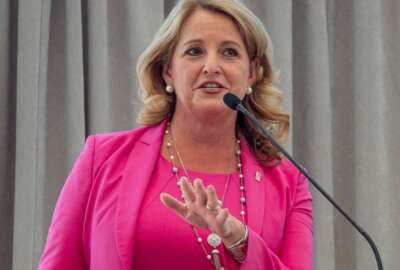 Exclusive
Exclusive CBP takes $15M loan to speed up revamp of 30-year-old system
The U.S. Customs and Border Protection directorate expects the new collections platform to help it become more efficient, resilient and secure in processing cargo...
The U.S. Customs and Border Protection directorate is taking a loan from the Technology Modernization Fund to accelerate a program that has struggled over the last several years.
The TMF Board announced it would lend CBP $15 million to modernize its Automated Commercial Environment (ACE) collections platform.
The ACE program, according to the Homeland Security Department, is “the backbone of the U.S. Customs and Border Protection’s trade information processing and risk management activities and is the key to implementing many of the agency’s trade transformation initiatives. ACE allows efficient facilitation of imports and exports and serves as the primary system used by U.S. Government agencies to process cargo.”
CBP has been working on ACE capabilities since 1994 and the program has seen its share of fits and starts. In 2006, Congress mandated CBP create a “single portal” to regulate the flow of commerce and more effectively enforce laws and regulations relating to international trade. The Government Accountability Office said in a 2018 report on ACE that performance problems halted implementation of ACE from 2010 to 2013. In 2014, then-President Barack Obama set a deadline of Dec. 31, 2016 to complete the system.
GAO found in its report that CBP was making real progress with ACE over the last few years. Users told GAO that the portal has reduced costs by making trade processing more efficient and has strengthened enforcement of trade laws and regulations.
But auditors say CBP delayed deployment of the collections platform—a capability for collecting import duties, taxes, and fees—while it considers alternative approaches to make this capability operational.
That is where the TMF loan now comes in.
CBP said it will use the extra funding to accelerate the collections modernization effort, which in 2018 GAO said faced several uphill challenges requiring the agency to pause and reconsider its approach.
Two years later, CBP says the TMF will help it move the collections platform off of 30-year-old COBOL code and into the cloud.
“CBP will also achieve operational efficiencies that will decrease its current software expenses and reduce other existing development and maintenance expenditures. CBP anticipates it will have a greater ability to serve its mission by modernizing the basic functionality of its collections system. This modernization will make CBP’s operations more efficient, resilient and secure, while safeguarding the nation’s global economic competitiveness through legitimate trade to benefit U.S. businesses and partnering government agencies,” the agency stated in the release announcing the award.
CBP’s chief information officer Phil Landfried recently retired after 16 years of federal service. Landfried played a big role in fixing ACE, implementing agile software development to deploy software that improved cargo processing and the agency’s relationships with trade partners and other government agencies.
This is the 10th loan the TMF Board has made to agencies under the governmentwide IT modernization account. It’s the first award since October when the board lent the Equal Employment Opportunity Commission and the Agriculture Department a total of $12 million to move off of paper-based systems.
Some members of Congress have been pushing for more funding for the TMF under the coronavirus stimulus bills. Reps. Gerry Connolly (D-Va.), Carolyn Maloney (D-N.Y.) and 11 other Democrat lawmakers sent a letter to House leadership and the Appropriations Committee chairman and ranking member asking to include $1 billion for the TMF in the latest stimulus bill.
The initial version of the Senate’s bill did not include any additional funding for the TMF.
In the fiscal 2021 spending bill, House lawmakers, so far, have allocated $25 million for the TMF despite the administration’s $125 million request.
Copyright © 2025 Federal News Network. All rights reserved. This website is not intended for users located within the European Economic Area.
Jason Miller is executive editor of Federal News Network and directs news coverage on the people, policy and programs of the federal government.
Follow @jmillerWFED






